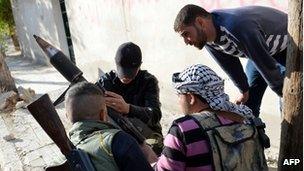Britons fighting with extremist groups in Syria, warns Hague
- Published

The UN estimates that some 70,000 people have died in the country's two-year conflict.
A "substantial number" of British citizens are fighting with extremist groups in Syria, the foreign secretary William Hague has warned.
He said violent Islamist groups were training recruits in the "uncontested space" created by the two-year conflict in the country.
This could pose a future threat to British national security, he stressed.
The UK has increased its support for groups opposed to the Assad government but warned of extremist elements.
Mr Hague made the disclosure, external in response to a letter from the Commons foreign affairs committee questioning UK policy in Syria - particularly in relation to whether the European Union's arms embargo on both sides in the conflict should be lifted.
The UK has expressed its frustration with the embargo and said it may need more flexibility to respond to events on the ground.
'Extensive training'
The foreign secretary acknowledged that the conflict is "precipitating a growth of extremism in Syria which poses current and future risks to UK national security", and more foreign fighters were now operating in Syria than in "all other arenas of jihad combined".
"Violent Islamist groups have been gaining ground in Syria and have attracted a large number of foreign fighters of all nationalities, including a substantial number of UK citizens," he wrote.
"There is enough uncontested space in Syria for some violent Islamist groups to provide extensive training. This is particularly concerning as we assess some of the individuals being trained will seek to carry out attacks against Western interests in the region or in Western states, now or in the future."
As well as the kidnapping threat this posed to British nationals working in Syria, there was a risk of terrorist attacks in neighbouring countries, such as Lebanon and Jordan, home to a larger community of British citizens.
In the letter, the foreign secretary makes its clear that the UK has made no decision about the future of the arms embargo but restates the government's view that it may need to be amended, or even lifted, in the event of a "grave deterioration" in conditions or a specific incident.
'Out of step'
Last month, David Cameron said "it is not out of the question" that the UK could veto the renewal of the arms embargo when it is next due for extension at the end of May.
Some MPs, including former foreign secretary Malcolm Rifkind, have backed the move, arguing that opposition fighters are being heavily outgunned by forces loyal to the Syrian President and this has led to huge casualties among civilians.
But others say such a move will only increase the bloodshed and weapons will inevitably fall into the hands of extremist groups opposed to a democratic future for Syria and Western interests in the region.
In his letter,, external written in March but only now published, the chair of the Commons committee, Conservative MP Richard Ottaway, said he was concerned that the UK was adopting a course of action towards the embargo which "is out of step" with its EU partners.
Mr Hague is due to discuss the crisis with US Secretary of State John Kerry and Arab leaders in Istanbul on Saturday and with EU foreign ministers on Monday